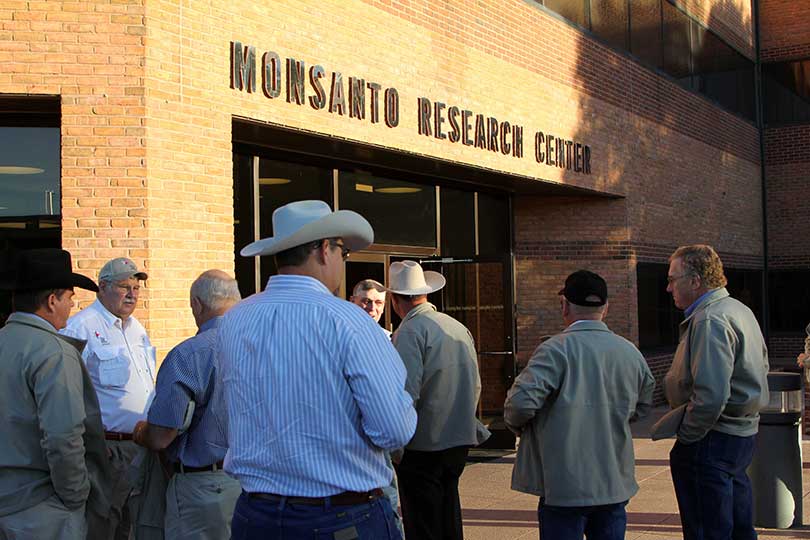By Shala Watson
Staff Writer
Sluggish markets and tight margins face farmers and ranchers. And those market forces have also impacted seed and pesticide companies, leading to several mergers.
The most recent proposed merger, the $66 billion Bayer-Monsanto deal, could potentially create the world’s largest crop protection and seed company in the world. This acquisition is only the latest in the agricultural consolidation wave that’s sweeping across the agribusiness realm.
“I absolutely believe there is a new wave of technology that is going to hit agriculture driven by data science and integrated solutions that’s going to help us meet the challenges going forward,” Brett Begemann, Monsanto’s president and chief operating officer, told the Texas Farm Bureau board of directors at a Sept. 27 meeting in St. Louis. “To me, I believe this drives the next wave of innovation faster. At the end of the day, that’s what we have to help them do is increase their productivity and do it in a cost-effective way for them to continue to be profitable.”
The two companies say the proposed deal, which is still subject to regulatory approval in Germany and the U.S., will help agriculture and feed an expanding population sustainably.
“There are huge layers of data that just weren’t accessible to us in previous years. Now we can use [the data] to help farmers to make better decisions,” Begemann said. “Not that they were making bad ones, we just need to make better ones to drive productivity and efficiency. I think that’s really going to happen in the next five to 10 years.”
But farmers are concerned that the wave in agricultural mergers will reduce competition and stifle innovation in agriculture.
The Agricultural and Food Policy Center at Texas A&M University conducted a study to show the potential impact agribusiness mergers would have on market share and farmers.
According to the study, the changes in market concentration resulting from the mergers meet criteria “that the Department of Justice and Federal Trade Commission would consider them ‘likely to enhance market power’ in the seed markets for corn and cotton.”
The study revealed significantly higher seed prices for farmers could result from the mergers, particularly for cotton growers.
Based on these findings, more studies should be done to evaluate the impact on other production inputs from the proposed merger of these large suppliers.
“Farmers and ranchers, in particular, are interested in how these deals will impact research and development budgets for companies like Bayer and Monsanto,” Bob Young, American Farm Bureau Federation (AFBF) chief economist, said in a statement. “We depend on access to enhanced technology and would hate to see agricultural innovation suffer at the cost of business decisions.”
Young said farmers and ranchers understand the wave of agricultural mergers is the result of market forces such as low commodity prices and the economic climate.
“Well, I think when you look at what’s been going on in the ag sector, what’s been going on at the farm and farm income levels, it’s not at all surprising,” Young told the Texas Farm Bureau Radio Network.
Bayer’s final offer accepted last month concluded months of negotiations.
“I think it’s perfectly understandable that again as the ag economy has slowed down from some of those heydays we had in 2011 and 2012. The companies were going to look to rationalize to find some partnerships that they could set up to kind of roll forward and that’s certainly what’s going on,” Young said. “I think it also probably made some sense, given where our technology sits today, for a chemical company to say let’s go talk to a genetics company.”
He also noted AFBF has received assurances from all parties involved that they fully intend to continue providing research and development funds, at least at the level they are now.
“So it won’t surprise me to actually see a bump in the research and development budget for Bayer-Monsanto or a bump in the research and development budget for Dow-DuPont.”
Five of the six largest seed and agrochemical companies currently are involved, or engaged, in merger and acquisition discussions. ChemChina is planning to purchase Syngenta. Last December, Dow Chemical Co. and DuPont agreed to merge, and the Bayer-Monsanto deal of



I am convenced the the merger of Bayer and Monsanto will increase the cost of seed and chemicals to farmers. The cotton farmers of West Texas are hard pressed to make a profit. Many of them will not pay out this year. We saw a wave of farmers go out of business here this last year and I think any increase cost of production will cause further exits from the farm.
Thanks,
A&M predicates the merger could increase cotton seed price to the farmer 18%. That would be in excess of $60.00 per bag for seed with a number of traits. Depending on planting testes that could add additional cost over $15.00 per acre.